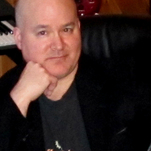"It was dark by the time Michael Chandler pulled in to the carport in front of his lonely San Mateo apartment at the end of the last normal day of his life."  I wrote that first sentence of The Just Beyond in my head two years before the physical writing began. (The two years were spent working out the plot in detail.) I wanted to write the kind of book I'd love to read, and that meant gripping the reader right out of the gate. Nothing frosts me in a novel like a beginning that drones on and on through "florid prose" that may conjure a vivid image--provided it doesn't put you to sleep--but does nothing to inspire a compelling visceral stake in the story. I believe a writer's first responsibility is to respect the reader's investment. Anyone who forks over a fistful of cash and hours of their precious leisure time so you can make a living doing something you love deserves your utmost courtesy. As a reader, I want to know right away who the main character is and why I should care what happens to them. A first sentence, a first page, a first chapter that merely paints the scene, no matter how lovely, doesn't do that. Neither does a focus on the character's entire life history. A novel should begin at the beginning--not the character's beginning or the setting's beginning, but the story's beginning: the single moment that touches off its central chain of events. Some biographical background and nimble scene-setting is necessary--of course it is. But the proper place for that backfill is after the reader is hopelessly hooked. And that regard for readers' gratification should be sustained throughout the entire work. A very popular writer of paranormal fiction comes to mind (I won't name him, but he has the same initials as an iconic Nintendo ape) who just doesn't seem to get this. So why is he so popular? Well, he has one thing nailed. His novels, even the weak ones, create a unique and memorable sense of atmosphere. He is a talented and inventive writer, craft-wise. But atmosphere is not a story. I recall one of his books, representative of this peeve, where nothing essential to the main plot happens until Chapter 12. CHAPTER 12!! And I recall another by this same author that took the reader on a wild ride, much of it quite enjoyable, only to flatline its potential with an end showing that the main characters were mere bystanders--nothing they did had any effect whatsoever on the story's climax. They may as well have been wallpaper. (The plot involved an evil secret military facility that essentially disintegrates as they make their way through it--but not because of anything they did.) The "it was all a dream" season finale of the old TV show Dallas was less cheap. This is a reprehensible breach of the readers' trust, and if these novels had been submitted before he made a name for himself with his earlier, better work, no publisher would have read more than a chapter or two before ashcanning the manuscripts. And it's too bad, because at their core those books held excellent promise. They might have been really good if the author had focused on their central concepts from the start and finished in a way that made the characters matter. I did my best to launch this book with a bang, keep the ball rolling, and end each chapter with a cliffhanger. Whether I succeeded is the readers' call, but I can say in good conscience that I strove with every word to reward those kind enough to buy it. They deserve nothing less. - Mark BACK TO HOME PAGE
0 Comments
Leave a Reply. |
Once upon
|
| The Just Beyond |
|

 RSS Feed
RSS Feed
